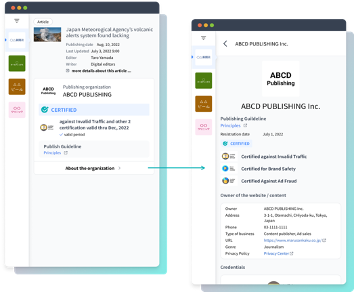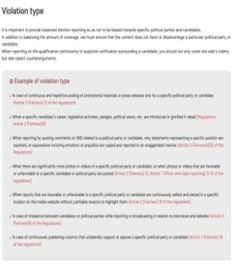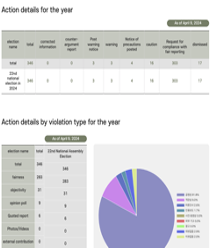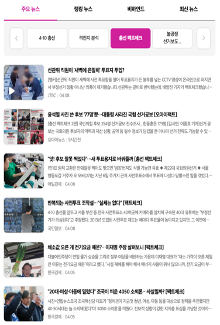As the global community grapples with various regulatory frameworks and policy recommendations put forward by states, social media companies, and academia, the pivotal role of traditional media and journalists often slips under the radar. The article discusses information integrity efforts in East Asia, including digital provenance and fact-checking. In specific, considering the vital social responsibility that the media holds in democracy, media organizations in Japan and South Korea have been exploring unique approaches to address the issue of online misinformation in a manner that safeguards freedom of expression with minimal government intervention. The Originator Profile (OP) project, tested and sponsored by the Japanese mainstream media, and the Unfair Election Report, operated by South Korean internet news portals, illustrate how traditional media can practically use existing laws and governance systems to provide more transparent and accurate information during critical national events while minimizing chances of possible government regulatory interventions.
The Originator Profile (OP)
A noteworthy endeavor in this field comes from Japan, where a novel initiative known as the OP is taking shape. In September 2023, at the World Association of Newspapers and News Publishers (WAN-IFRA) meeting in Taipei, Japan’s largest news media, Yomiuri Shimbun, introduced their sponsorship of OP as a part of the media’s efforts to combat the spread of misinformation. The OP was devised by the researchers at Keio University’s “Cyber Civilization Research Center (CCRC)” in 2022 aimed to provide easy identification of high-quality, third-party verified news articles and media by embedding verifiable information about web content creators and advertisers. The overarching goal of OP is to establish information integrity of online news reports, particularly in the face of challenges posed by false narratives and online propagandists.

<Source: WAN-IFRA. Shows how the electric identifiers are embodied to the news website>
The OP technology systematically embeds an electronic identifier into digital content, including news articles and advertisements, to enhance the transparency and credibility of online information. This unique marker not only stores data about the content’s creators, such as basic company information, editorial policies, and privacy practices, but also facilitates the immediate distinction between authentic content and potential misinformation. When digital content is created, the embedded OP marker provides verifiable details about the originators and the distribution channels, which is then independently verified by a third party. This verification process, reinforced with an authentication icon visible within the browser, confirms the existence and authenticity of the content originator, covering extensive information such as the corporate stance, reporting obligations, and editorial guidelines. Consequently, this sophisticated verification mechanism supports the validation of the content’s reliability, empowering users to make informed decisions regarding the trustworthiness of the information they consume online.

<Source: Originator Profile. Shows how OP informs corporate stances>
The implementation of the OP requires collaboration among various stakeholders, including media companies, advertising firms, technology providers, and notably, academic researchers. In this effort, multiple Japanese media organizations, prominently the Yomiuri Shimbun, have sponsored the CCRC and established the Originator Profile Collaborative Innovation Partnership (OPCIP). Currently, OPCIP includes 37 Japanese news media agencies, advertising companies, and online magazines. Dr. Jun Murai of Keio University’s CCRC leads OPCIP, with representatives from partnering corporations and media industries serving as stakeholder members. OPCIP operates as a non-profit organization and is currently preparing to start trial demonstrations of the technology, aiming for its practical application by 2025.
Following the disinformation incidents during the natural disasters, the Japanese government has demonstrated significant interest in developing and deploying Originator Profile (OP) technology. This initiative aims to counteract disinformation and safeguard intellectual property rights in the era of generative artificial intelligence. The AI Strategic Council, under the Cabinet Office, has affirmed the efficacy of OP technology in defending intellectual property rights against the challenges posed by generative AI. The council further identified that Japan’s existing copyright law could offer legal frameworks to employ OP technology against AI-generated misleading narratives within online news portals and the advertisement sector. Additionally, it has outlined proposals that incorporate OP technology as a means to determine the origin of content, differentiating between human and AI-generated information.
Prime Minister Fumio Kishida has underscored the significance of OP technology in the Hiroshima G7 AI Process that the implementation of electronic markers in OP technology stands as a pivotal strategy in combating the misuse of AI-generated content, particularly during electoral events. As a follow-up, the OPCIP is diligently working to promote OP technology as a global standard. They are focused on refining and practically applying this technology, starting with real-world tests to ensure the OP system functions correctly across actual network environments. The plan includes progressively increasing the integration of OP markers in articles and advertisements. After thorough development and testing, OPCIP aims to submit the technical specifications for OP to the World Wide Web Consortium (W3C), a main web standards development organization. OPCIP’s goal is to establish OP as a universal standard that enhances the reliability of web content globally.
Unfair Election Reports
The 2024 general election in South Korea, held on April 10th, was notable for the resounding victory of the left-wing Democratic Party, which won nearly twice as many votes as the conservative People’s Power Party. This election was also significant as it marked the first time Korean media implemented the ‘Unfair Election Reports‘ on the country’s three most influential online news portals—Naver, Daum-Kakao, and Nate, which act as intermediaries within the media structure, linking news articles published by traditional media to online users. These portals aggregated news articles identified by the press and the Internet Election News Deliberation Commission (IENDC) as violating fair reporting standards during the campaign period. Subsequently, these intermediary news portals listed the offending articles in a designated Unfair Election Report section. This initiative was part of a voluntary effort by the media to enhance the accuracy and integrity of the information available to voters.
The IENDC, an independent body under the National Election Committee (NEC) and detached from any executive or political influence, adjudicates these violations according to the Public Official Election Act. The Act delineates the IENDC’s role, which includes maintaining the impartiality of election reporting as stated on the websites of internet press agencies, and managing personnel. Specifically, 11 commissioners are appointed by the NEC, recommended by various groups including political entities, scholars, the legal community, the press, and the Korea Communication Standards Commission, as outlined in Article 8-5. Article 8-6 further specifies how the IENDC reviews online election reports to determine if they result from proper deliberations, and it authorizes the IENDC to mandate corrections or removals of reports. The article particularly emphasizes the need for deliberation in judging the fairness of the reports. Finally, based on the Public Official Election Act, the IENDC develops criteria for violations of the law and publicly shares detailed descriptions of these violations, thereby clarifying what types of election reports can be sanctioned and for what reasons


<Source: IENDC. Violation typology and number of unfair election reports data>
Although the IENDC has been active since 2009 and has published its data on its own website, the public has seldom recognized it due to a lack of publicity and limited motivation to seek it out. However, this year’s election marked the first time that intermediary news portals collectively displayed the unfair election reports identified by the IENDC on their platforms, making them visible to every voter. While there is no legal requirement for online news portals to publicly display these reports, the intermediaries in South Korea have voluntarily collected individual unfair election reports and made them publicly accessible, including the names of the news agencies. Generally, news agencies opt to delete reports deemed unfair rather than correct them due to fears of losing credibility. However, the Unfair Election Reports have rendered such secretive efforts futile, as the intermediary portals archive all identified unfair reports, both existing and previously deleted, and make them available to the public. This is primarily feasible because Naver, Daum-Kakao, and Nate are the three most widely used online news portals in South Korea, and without maintaining contracts with them, news agencies risk losing their platforms for publishing their reports.
The Unfair Election Reports archives of Naver, Daum, and Nate comprise news articles published during elections from 2012 to the present year. These archives were made publicly accessible on their web portals starting this year. Common themes identified in this year’s reports include character defamation of candidates and their families, controversies over election fraud, distortions of historical facts, and, most notably, the repeated biased coverage of specific candidates and political parties without presenting counterarguments or providing information sources deliberately. Intriguingly, from this year onwards, these news portals began to identify deepfake and other AI-generated content that violated fairness standards, in collaboration with the NEC, and have included these in their archives. While AI-generated unfair election reports have not been identified this year, it is crucial to remain vigilant about the potential for such occurrences in future elections.


<Source: Nate, Daum. Unfair Election Reports webpages>
Implication
Both the OP and Unfair Election Reports are initiatives designed to combat misleading and imbalanced news articles on their respective news portals, thereby enhancing transparency and providing more accurate information to readers. While the Unfair Election Reports are tailored to address specific, temporary national events, the OP aims to develop a more comprehensive online news originator identification system, with the long-term goal of establishing it as an international standard. Despite differences in scope and objectives, both initiatives highlight significant implications for the role of traditional media in the digital age and the regulatory frameworks aimed at countering misinformation and disinformation that are currently being explored in various countries.
Firstly, these initiatives underscore the enduring importance of traditional media as a conduit of information, despite the rising influence of social media platforms and their content moderation efforts. Traditional media can play a proactive role in providing accurate information and contributing to a less harmful and healthier online environment. Secondly, the cases of OP and Unfair Election Reports demonstrate that existing laws and governance systems can still be effective in addressing some aspects of disinformation, suggesting that more flexible interpretation and application of the current regulations may be more effective than the creation of new laws and community guidelines observed in other nations. This approach emphasizes leveraging and improving upon existing frameworks rather than overhauling them completely.
Moreover, OP and Unfair Election Reports differ notably from other media fact-checking entities like EUvsDisinfo, Logically, and NewsGuard. EUvsDisinfo, funded by the European External Action Service (EEAS), primarily targets disinformation related to Russia, reflecting the EU’s official stance. In contrast, Logically (based in the UK) and NewsGuard (based in the US) operate as market-driven entities, with NewsGuard engaging in contracts with governments and private organizations to provide comprehensive disinformation analyses. Logically runs an independent fact-checking subsidiary, Logically Facts, which is part of Meta’s Third Party Fact-Checking Program and collaborates with TikTok in India.
Unlike these entities, both OP and Unfair Election Reports are non-profit, non-public initiatives that engage multiple stakeholders, including academia, traditional media, and government for OP, and news portals, media, and independent election committees for the Unfair Election Reports. This multifaceted collaboration highlights the diverse East Asian governance approaches to combatting misinformation during critical national events.
